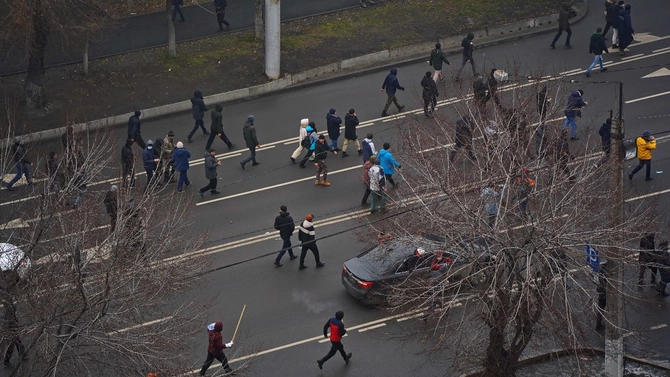
Aisana Ashim, a 31-year-old media entrepreneur and founder of multiple publications, is fighting for independent journalism in Kazakhstan.
Image: courtesy photo
A 31-year-old media entrepreneur Aishana Ashim has founded three major media outlets in Kazakhstan. In our interview, she shares how she left journalism to build her own media empire, why the government cannot fund independent journalism in Kazakhstan, and how The Village Kazakhstan “bullied Nazarbayev.”
In recent years Kazakhstan has gone through major political changes. From the resignation of first President Nursultan Nazarbayev after over 27 years as the country’s leader but keeping his status as the “Leader of the Nation”—which protected him and his family from any future persecution—to the capital city Astana being renamed to Nur-Sultan after him. This series of events sparked demonstrations; however, an unprecedented wave of country-wide protests only culminated in January 2021. What started as dissatisfaction over increased gas prices turned into the biggest attempt to overthrow the government in the history of the country’s independence. As a result, the government shut down the internet, creating an information vacuum. That’s when the role of independent media in Kazakhstan became vital. Among those that were reporting on the ground were The Village Kazakhstan and Masa Media, new media founded by a journalist turned media entrepreneur, Aisana Ashim.
At 31, Ashim is an imprint of a successful woman in Kazakhstan. She is a leading force behind three successful media outlets in Kazakhstan—in addition to The Village Kazakhstan and Masa Media, Ashim’s newest media project, Batyr Jamal, focuses on feminist issues. Yet, six years ago, when she was starting her entrepreneurial career, Ashim, although an experienced journalist who previously worked at renowned publications such as Forbes Kazakhstan, Esquire Kazakhstan, SNC Kazakhstan, and The Steppe, had no experience in business beyond her Business Administration degree from one of Kazakhstan’s top universities, KIMEP.
Ashim remembers how after completing her three-week internship at Medusa, a Russian news website based in Latvia, by fate or circumstance, she was recommended to The Village’s management team in Russia, which was selling its franchise in Kazakhstan. After conversing with The Village Russia, borrowing money from her mother to start her business, and gathering content for three months, The Village Kazakhstan was launched in September 2017.
For the first year, Ashim was optimistic about combining her CEO and editor-in-chief roles. “I had the wrong mindset. I was solely a journalist, and I thought, now we will make content, and since we made money from advertising, advertisers will come to us themselves.” During that first year, the lack of advertising projects— all revenue was used to cover salaries and administrative expenses—resulted in the realization that something needed to change. “I walked around Almaty thinking what I would do. It was a turning point,” Ashim describes. “Either I declare myself bankrupt and go back to being employed, which is okay, I won’t die, I will pay this debt for several years. Or I need to change. In the end, I decided to continue.”
She gave up her position as editor-in-chief to focus on sales. “I had five meetings with clients per day. If I didn’t go to meetings I would sit in the office and talk on the phone.” Ashim’s determination to financially stabilize her media project led to growing the team and moving into a new office. Having achieved this, Ashim eventually gave up sales. Today her duties are no less intimidating—from accounting to PR and marketing—she hopes to expand the team and have employees eventually take over these responsibilities.
“Our original concept was lifestyle, but after Nazarbayev left and they renamed Astana, there were protests in which I also took part; when it all began, we started covering all these events for political reforms and activists. We tried to be the driving force of it all,” Ashim explains, adding that her team didn’t expect these changes. “They weren’t ready for it, they didn’t have skills, but we survived it all. We chose this path, and since then, we didn’t leave it because it’s our civic duty.”

Image: Vladimir Tretyakov/Shutterstock
When asked if a journalist can be an activist, she replies that while it’s important not to let activism affect objectivity, she believes “when we live in such a country, in such conditions, where corruption, lawlessness, and violence exist, it’s a crime to be indifferent.” She further explains, “When you live in Kazakhstan, everyone should be an activist. Just open the news and see where you live.”
As the political situation in the country remains dire, Ashim’s Masa Media’s mission to educate the younger generation on politics, human rights, and laws is of major importance. “When you don’t know who to vote for, how are you going to vote,” pointing out commonplace political illiteracy. Ashim turned to foreign funding to open Masa Media in 2020. “It is important to clarify that because of Russian propaganda, dollars are being demonized,” she says, adding that some go as far as calling them “Western agents” because of that. “It’s complete nonsense. They never told us what and how to write.”
Ashim shares that asking Kazakhstan’s government for funding would mean that “a government official can call you and ask to delete any material they don’t like. It doesn’t have to be related to politics; it can be about culture.” Moreover, the new mass media law imposes more restrictions and regulations, making it harder for journalists to report on events, while the government gains even more control over the media. “We have no other choice but to keep working,” Ashim says.
The Village Kazakhstan had its fair share of pressure from the government. On May 9, 2019, they were among other independent media websites that the government blocked due to their coverage of the arrests of protesters that day. Additionally, in July 2021, a mural of a young Nazarbayev with the words “Forever Young” and “Elbasy” (Kazakh: the leader of the nation) was repainted by anonymous activists into a face of a clown with “Uly dala ury” (Kazakh: thief of the great steppe) and “Cancel” written next to “Elbasy”. When The Village reported on this, government officials claimed that they violated the law on the first president—since then annulled—and “bullied Nazarbayev” according to community guidelines on Facebook. The only way for The Village to keep the article up was to blur the image of the ‘clown’ mural.
Her latest media project Batyr Jamal was launched in 2021 with the mission “to make sure that every girl and woman is safe in Kazakhstan.” Although it currently doesn’t have a website, its social media profiles on Instagram, Telegram, and TikTok are gaining popularity among Millennials and Gen-Z. As Batyr Jamal reports on topics involving abuse and violence against women, Ashim shares that “advertisers don’t want to go there,” which means that to sustain the project she will need to apply for other foreign funds.
It is clear that the path of a media entrepreneur in Kazakhstan is not only financially uncertain but can even be dangerous due to governmental pressure. Yet Ashim doesn’t regret anything. Today she proves that launching a successful media startup and building a successful entrepreneurial career in Kazakhstan is possible.
At the end of our interview, Ashim wants readers to not only associate Kazakhstan with its problems but with the people who are trying to change it all for the better. “Unfortunately, only our problems are brought into the public field—dishonest elections, protests, murders of women—but we are fighting with this, and there are people who want changes. We hope and believe that we will live in a better country.”
Share on social media